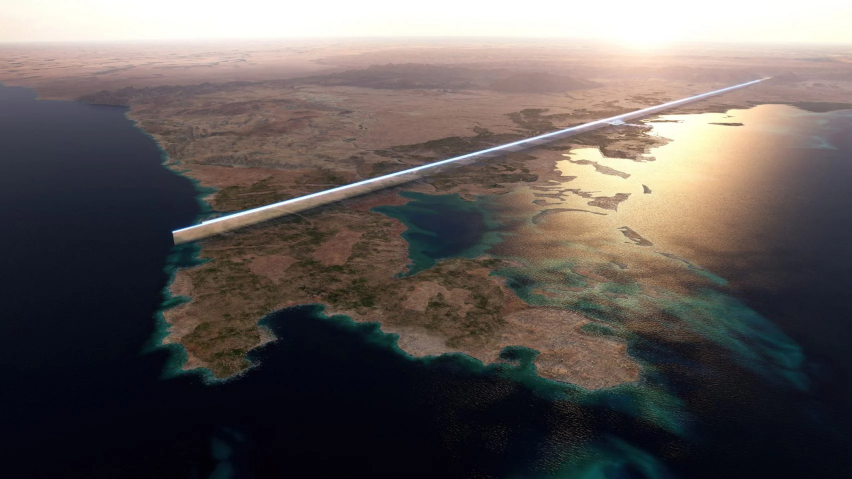
Saudi Arabia denies Neom human rights abuses in response to UN report
Saudi Arabia has officially responded to a United Nations Human Rights Council report criticising death sentences for three men connected to the Neom mega project.
A letter from the Permanent Mission of the Kingdom of Saudi Arabia to the United Nations rejected that three men were sentenced to death for criticising evictions for the Neom project and claimed they were terrorists connected to organisations Daesh and Al-Qaida.
"The information contained in the joint communication is inaccurate and contains false allegations and claims that are based solely on information received from the source without substantiation or evidence," said the response.
"The joint communication alleged that the penalties imposed on the said persons were simply for expressing their opposition to the evictions, which is totally untrue. The penalties imposed on them were for being convicted of terrorist offences."
Saudi claims men convicted for "supporting two terrorist entities"
The 27-page letter outlines the accusations against Shadli bin Ahmad al-Huwaiti, Ibrahim bin Salih al-Huwaiti, and Atallah bin Moussa al-Huwaiti, who human rights organisation ALQST reported were sentenced to death after being "forcibly evicted" from the Neom site in October 2022.
It states that the cousins, who are part of the Huwaitat tribe, were arrested and tried for "joining a terrorist entity seeking to corrupt the country through armed insurrection against the state", possessing weapons for use in terrorist activities, "incitement to participate in terrorist acts" and "supporting two terrorist entities (Daesh and Al-Qaida)."
It added that Ibrahim al-Huwaiti was additionally accused and convicted of "financing of terrorism and supply of weapons and ammunition to terrorists for use in terrorist operations".
Death sentences awaiting Supreme Court decision
The letter confirmed that the three men had been sentenced to death and that this decision was upheld at the Court of Appeal. The decision is now "pending" before the Supreme Court, according to the letter.
The death sentences were criticised by the United Nations Human Rights Council in May this year. A statement published by the organisation expressed alarm over the imminent executions and urged the Saudi authorities not to carry out the executions.
"Under international law, states that have not yet abolished the death penalty may only impose it for the 'most serious crimes', involving intentional killing," the experts said. "We do not believe the actions in question meet this threshold."
The UN experts also criticised reported forced evictions on the Neom site to make way for the project, which will be built on lands traditionally held by the Huwaitat tribe.
"Given the circumstances, we cannot consider that the requirements of consultation and free, prior and informed consent of the Huwaitat people of the three villages have been met," said the experts.
Over 6,000 people relocated for Neom
In response to these reports, the Permanent Mission of the Kingdom of Saudi Arabia to the United Nations denied that any forced evictions had taken place.
"The method of forced eviction or displacement is not practised in the Neom or other projects, regardless of whether the population have or do not have documentary proof of property ownership meeting the legal requirements," it said.
"The process of population relocation passed through a number of phases beginning with consultation sessions, followed by citizens’ reception and then the provision of development interventions."
According to the letter, 1,143 families, comprising a total of 6,360 individuals, have so far been relocated due to the Neom project.
The government claims that these people have been fully compensated for their homes and immovable assets.
It states that the amounts were determined by "an impartial committee comprising members from several government agencies as well as two independent members".
Over 1,000 grievances received
It also stated that those affected by the Neom project can lodge complaints with the Board of Grievances. This organisation has received 1,352 grievances "on a wide variety of matters from property owners and residents affected by relocation", according to the letter.
An initiative of Saudi Arabia's crown prince Mohammed bin Salman, Neom is being developed on a 10,200-square-mile site in the northwest of the country.
It forms part of the Saudi Vision 2030 plan to diversify the country's economy and reduce its dependence on oil and will include a 170-mile-long city named The Line.
In a recent documentary focused on the project, Mohammed bin Salman claimed the city was necessary to house Saudi Arabia's growing population.
"The population is going to jump in Saudi Arabia from today 33 million, in 2030 something between 50 to 55 million," he said.
"In 2030, we will reach the full capacity of Saudi Arabia’s current infrastructure. That raises a very important question – that we need to create a new city."
Along with being one of the world's largest projects, The Line is also one of the most controversial. Along with human rights abuses, it has been criticised by experts for its sustainability and liveability claims.
Speaking to Dezeen, Amnesty International's Peter Frankental said that companies working on Neom were facing a "moral dilemma" and should "think twice" about their continuing involvement in the project.